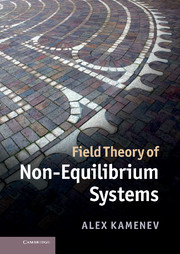Book contents
- Frontmatter
- Contents
- Preface
- 1 Introduction
- 2 Bosons
- 3 Single-particle quantum mechanics
- 4 Classical stochastic systems
- 5 Bosonic fields
- 6 Dynamics of collisionless plasma
- 7 Kinetics of Bose condensates
- 8 Dynamics of phase transitions
- 9 Fermions
- 10 Quantum transport
- 11 Disordered fermionic systems
- 12 Mesoscopic effects
- 13 Electron–electron interactions in disordered metals
- 14 Dynamics of disordered superconductors
- References
- Index
14 - Dynamics of disordered superconductors
Published online by Cambridge University Press: 07 September 2011
- Frontmatter
- Contents
- Preface
- 1 Introduction
- 2 Bosons
- 3 Single-particle quantum mechanics
- 4 Classical stochastic systems
- 5 Bosonic fields
- 6 Dynamics of collisionless plasma
- 7 Kinetics of Bose condensates
- 8 Dynamics of phase transitions
- 9 Fermions
- 10 Quantum transport
- 11 Disordered fermionic systems
- 12 Mesoscopic effects
- 13 Electron–electron interactions in disordered metals
- 14 Dynamics of disordered superconductors
- References
- Index
Summary
We generalize the non-linear sigma-model to include interactions in the Cooper channel. As its stationary point approximation we derive coupled Usadel, selfconsistency and Poisson equations. We use them to derive the Josephson current of an SNS junction, as well as the dispersion of the collective Carlson–Goldman mode of the superconductors. In the gapless case one may explicitly integrate out fermionic degrees of freedom, obtaining the time-dependent Ginzburg–Landau action. The latter is used to derive the Aslamazov–Larkin fluctuation correction to the normal state conductivity.
Cooper channel interactions
So far we have been mostly discussing the effects of singlet channel electron–electron interactions. We turn now to the Cooper channel interactions, see Eqs. (9.57)–(9.59). As was realized by Bardeen, Cooper and Schrieffer (BCS) [214], exchange of virtual phonons with large wavenumbers q ∼ kF mediates effective attractive interactions in the Cooper channel. The latter lead to formation of two-electron bound states – Cooper pairs, which form a condensate below a certain critical temperature Tc. The superfluid current of such a condensate is charged and results in a phenomenon known as superconductivity. In this chapter we restrict ourselves to the theory of disordered superconductors, i.e. those where Tc « ħ/τel. This condition is indeed fulfilled for many conventional superconductors (but not for cold atom realizations). It actually considerably simplifies the theory by ensuring the spatially local character of the correlation functions.
- Type
- Chapter
- Information
- Field Theory of Non-Equilibrium Systems , pp. 298 - 330Publisher: Cambridge University PressPrint publication year: 2011



